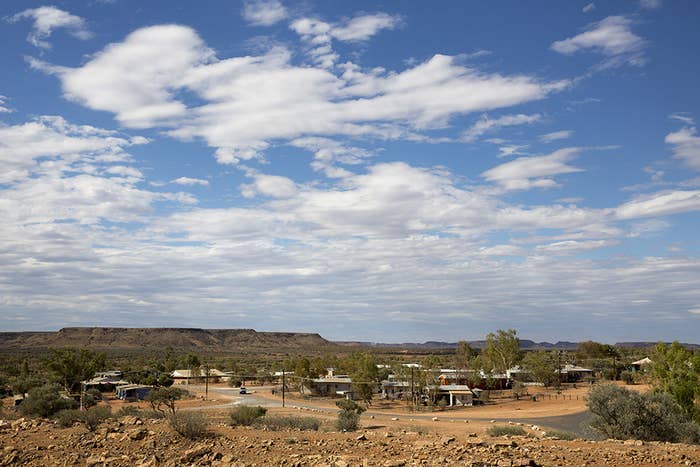
Hundreds of lease agreements the Northern Territory government signed with residents across the NT’s remote communities over the last decade are likely to be invalid, after a tribunal decision on Wednesday found there were problems with the leases signed in a community outside Alice Springs.
The government could owe residents across the Territory “a significant amount of money” because of invalid rent increases, according to the lawyer who brought the case to the tribunal.
Residents of Santa Teresa, 80km from Alice Springs, prevailed over the government in a long-running case over the state of their housing on Wednesday. The residents should be paid thousands of dollars in compensation for housing that was occasionally uninhabitable and in disrepair, the NT Civil and Administrative Tribunal found.
But the tribunal also found that the lease agreements the government got residents to sign were invalid. The problems with those leases are likely to extend beyond Santa Teresa, throwing agreements across the NT’s 72 remote communities into doubt.
"The immediate impact of this finding is that it seems any rental increases sought by the NT in 2017 are now unlawful, and that money should immediately be returned to tenants," said Daniel Kelly of Australian Lawyers For Remote Aboriginal Rights (ALRAR), which represented the Santa Teresa residents.
"It’s potentially a significant amount of money."
Seventy Santa Teresa residents filed a lawsuit in early 2016, with the tribunal hearing four of their cases because there all shared common issues.
In each case, residents signed lease agreements with the government in 2010 or 2011.
In three cases, they signed a second contract in 2017, which was supposed to replace the earlier one.
But all these leases failed to comply with legal requirements and were invalid.
While the 2017 leases purported to replace the earlier leases, the government did not give notice that a lease was being terminated, as the law required.
"They just turned up on people’s doorstep with these new leases," said Kelly.
The earlier leases had a term requiring residents to maintain a higher standard of cleanliness than the Residential Tenancies Act allowed, meaning the whole document was void.
For two of the four residents, the 2010/2011 leases would have been invalid anyway because the government never signed them.
All leases signed in remote communities in 2010-2011 are likely to be invalid, Kelly told BuzzFeed News.
The consequence is that the rent residents should have been paying may be lower than what was actually being taken out of their accounts.
The real lease between the government and the residents was the standard-form lease contained in the Residential Tenancies Act, the tribunal found.
Under that lease, the rent is whatever was agreed at the beginning of a tenancy. So any rent increases since 2010 and 2011 (when the government’s new remote rent policy was being rolled out) will be invalid, unless the government gave proper notice and left out the term about cleanliness.
"Where this will have an impact is for communities who have had repairs and upgrades carried out and therefore rent increases," said Lou Darganfrom Grata Fund, which financed the case. Those increases are now in doubt.
Because rent varies, the amount the government could owe tenants is difficult to estimate.
On its website, the government lays out different maximum rents for new builds, refurbished houses and older houses in remote communities. For a one-bedroom house, the maximum weekly rent goes up from $90 to $120 once a house is refurbished, and then up to $150 for a new house.
Kelly is calling for an audit of rents and leases to ensure the government is collecting the correct rent.
On top of the 2017 leases being invalid, the tribunal said the way the government had them signed was not "fair play".
Although litigation had been underway for over a year, the government failed to notify Kelly that his clients were being asked to sign new agreements. He only learnt about them in late 2018.
Tribunal member professor Les McCrimmon said it was "improper" for government workers to contact the residents about new leases without informing Kelly, and that it fell “below the honest and fair handling of litigation expected of a model litigant.”
Minister for local government, housing and community development Gerry McCarthy declined to respond to questions about the extent of the invalid leases and whether the government would complete an audit.
McCarthy pointed out that since coming to government in Sept. 2016, the government had upgraded 93 out of 99 homes in Santa Teresa.
The NT department of housing declined to comment.
